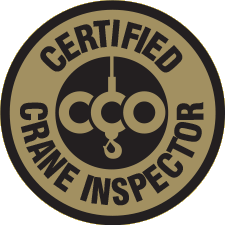June 2015—The National Commission for the Certification of Crane Operators’ (NCCCO) ANSI-accredited CCO Crane Inspector certification is proving to be a valuable tool for those responsible for maintaining the nation’s fleets of cranes.
 “We are seeing that our CCO Crane Inspector certification program is increasingly popular with owners and employers who understand the safety and cost benefits of a professionally developed assessment process and who recognize its place within a comprehensive risk management process,” stated NCCCO Manager of Business Development, Matthew Eckstine.
“We are seeing that our CCO Crane Inspector certification program is increasingly popular with owners and employers who understand the safety and cost benefits of a professionally developed assessment process and who recognize its place within a comprehensive risk management process,” stated NCCCO Manager of Business Development, Matthew Eckstine.
Moreover, CCO certification is providing an effective means of complying with OSHA’s new Cranes and Derricks standard and its detailed requirements for the periodic inspection of cranes and derricks used in construction and the records that must be kept. OSHA’s requires cranes to be inspected after assembly, repair, jumping (tower cranes), and disassembly, in addition to daily (shift), monthly, and annual inspections.
Recently, representatives from NCCCO and Stephenson Equipment, Inc. (Harrisburg, PA) reviewed those requirements with attendees of the Association of Equipment Management Professionals’ (AEMP) 2015 Management Conference and Annual Meeting in Orlando, FL. The 300+ meeting attendees are responsible for the maintenance and safety of more than a million pieces of equipment in the U.S.
The national CCO Crane Inspector certification program followed the development by NCCCO of the Washington State Crane Certifier program, and was created jointly by NCCCO and the Crane Certification Association of America (CCAA). The CCO certification was initially launched in November 2011 and became accredited by ANSI in December 2012. Inspectors can be certified to inspect mobile cranes, tower cranes, and/or overhead cranes. Requirements for certification include at least five years of documented crane-related experience and/or formal technical education and passing rigorous written exams for the certification(s) being pursued.
To date, nearly 140 crane inspectors have earned CCO certification, many of whom are listed in NCCCO’s online directory of those available to perform inspections in specific regions across the country (www.nccco.org/CIdirectory). CCO-certified crane inspectors are also permitted to use a special CCO Certified Crane Inspector logo as a way to readily identify themselves as qualified by a third party.